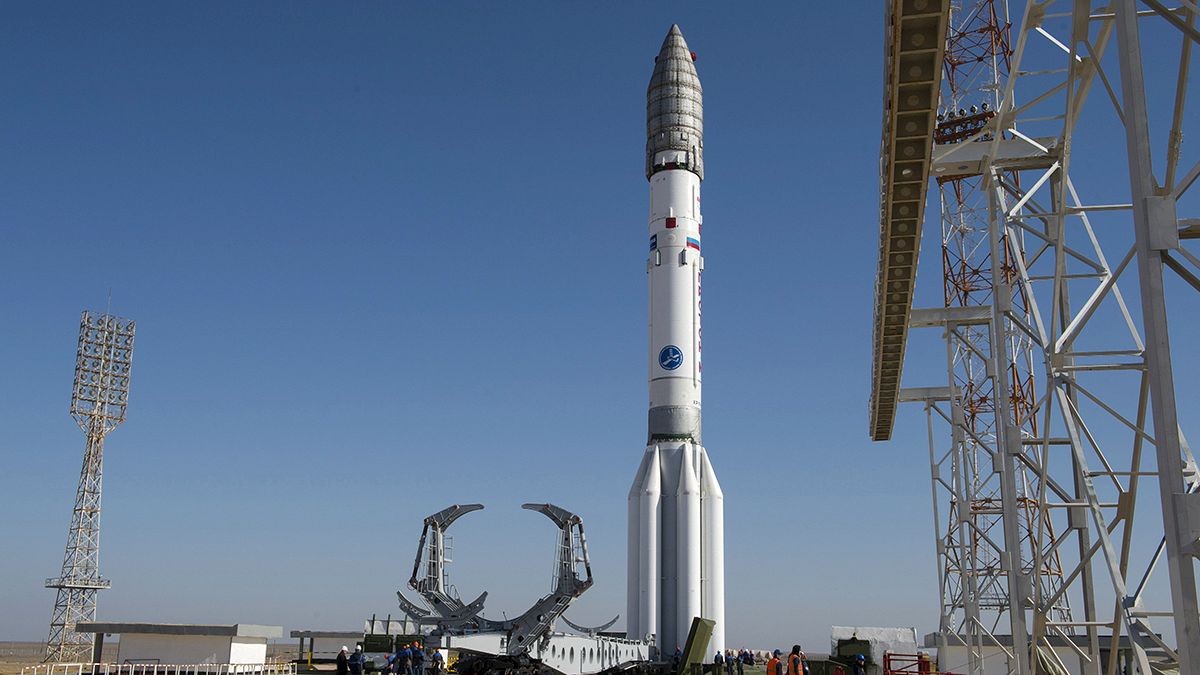Scientists from the European Space Agency and Russia’s Federal Space Agency face a weekend of intense tinkering ahead of Monday’s ExoMars mission
Scientists from the European Space Agency and Russia’s Federal Space Agency face a weekend of intense tinkering ahead of Monday’s ExoMars mission launch.
The objective is the elusive search for life on Mars – or more specifically the search for methane, a gas produced by living organisms.
A huge proton rocket will fire the orbitor and the probe to the Red Planet from Baikonor, Kazakhstan.
Great video from this morning's #ExoMars#Proton rollout to the launch pad! https://t.co/XWXEAeSqf4
—
ESA_ExoMars (ESA_ExoMars) 11 March 2016
After a seven month journey the ExoMars orbiter will release a stationary probe to the surface and then remain in orbit as the search for biosignatures of Martian life, past or present, gets underway.
While on the planet surface the probe will map methane sources and select a suitable landing site for the Russian-built ExoMars rover, due to be launched in 2018.
The rover will land on Mars in January 2019, and is currently undergoing tests in Stevenage in the UK.
It will use a two meter drill to extract samples from below the planet’s surface.
Scientists have devised a two-pronged attack for life on Mars – with the rover looking for evidence of microbial activity from the past, while the probe and the orbiter look for contemporary life signs.
Scientists are optimistic after the 2014 recordings of ‘burps’ of methane by Nasa’s Curiosity Rover.
#ExoMars mission will search for signs of life on the Red Planet: https://t.co/o2Zn7fZGof
ESA_ExoMars</a> <a href="https://t.co/kDsSFRzLh4">pic.twitter.com/kDsSFRzLh4</a></p>— Science News (ScienceNews) 11 March 2016
Euronews correspondent Jeremy Wilks spoke to
Cathy Quantin-Nataf, a geologist and committed Mars watcher from the University of Lyon.
Jeremy Wilks, euronews:“Will the Exomars mission manage to prove, once and for all, whether there has ever been life on Mars?”
Cathy Quantin-Nataf, University of Lyon: “I hope so. I really hope so. In any case, there are technical and instrumental ways to answer that question, whether there’s life today and has been in the past.”
euronews: “What kinds of clues have we got now, what hints have we got about life?”
Cathy Quantin-Nataf: “Right now, on the surface of Mars it’s difficult to live life as we know it today. In the past we think the conditions were very favourable, that’s why we’re very obsessed with habitability, the conditions favourable for the emergence of life in its old state. So that’s roughly where we are, in finding out whether life is possible today and whether it existed in the past.”
euronews: “What’s different about this mission, the Exomars 2016 mission?”
Cathy Quantin-Nataf: “This mission is really focused on the traces of life. Until now missions were really focused on habitability, the emergence of life, now this is really about traces of life. In particular, this mission is focused on the atmosphere, on clues in the atmosphere as to microbial life, past or present.”
euronews: “What are your thoughts on it? Do you think that’s life on Mars now?”
Cathy Quantin-Nataf: “Scientists can’t answer that question yet. But we can’t say that there isn’t life either.”
euronews: “There’s a chance…”
Cathy Quantin-Nataf: “There is a chance that there is life on Mars today. And we really feel there’s a chance that there has been (life) in the past.”
euronews: “You’re looking for methane. Tell us why methane is so important to you.”
Cathy Quantin-Nataf: “Because there are microbial activities that produce methane. That’s the reason why we track microbial activity. It’s not only microbial activity that produces methane, though. There are also geological processes that are utterly a-biotic, with no trace of life. They are biological processes that produce methane. We will have to differentiate, and we will have the means to do so, whether the methane is of biological or rather geological origin.”
euronews: “Is the methane in the atmosphere of Mars now?”
Cathy Quantin-Nataf: “Well, moments where methane was present in the atmosphere have been detected, it was detected a few years ago, like moments where there was more methane in the atmosphere, we’re trying to understand why. And whether it was linked to biological activity or not, we don’t exactly have the answer yet. But from time to time there is methane in the Martian atmosphere and we don’t know where this methane comes from.”
euronews: “How significant really then in the end is this ExoMars mission for you, the science team?”
Cathy Quantin-Nataf: “Really that’s the idea of throwing out this question, to find out whether life has appeared only on our planet or not. It’s the big question for ExoMars, I hope that this mission will answer it. Has life developed on a planet other than Earth?”
Got questions about #ExoMars? #AskESA and our mission experts will answer in Twitter Q&As on Monday! pic.twitter.com/b2YpwJhOAE
—
ESA_ExoMars (ESA_ExoMars) 11 March 2016
